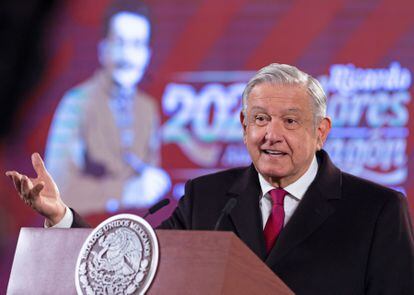The president of Mexico, Andrés Manuel López Obrador, in his press conference this Monday.Mexican Presidency HANDOUT (EFE)
The inauguration of Daniel Ortega for a fourth term at the helm of Nicaragua has ignited controversy in Mexico. In the last 24 hours, the Mexican authorities have lurched several times. The dispatch of a diplomatic entourage was first announced, but the Foreign Ministry backed down after being widely criticized for the decision. The president, Andrés Manuel López Obrador, hinted this Monday that he was not aware of or in agreement with the cancellation and has amended the plan once again, assuring that it would be “reckless” for no Mexican official to go to the ceremony of Ortega, reelected after imprisoning all opposition candidates. "It is the decision of the Nicaraguans," said López Obrador, in a boost to his Nicaraguan counterpart and to an election held between accusations of massive fraud and international convictions.
"It has not been decided yet," he responded to López Obrador to a reporter who asked him what he thought about no official being sent. Confused, the president asked when was Ortega's inauguration and did not hide his surprise when he learned of the decision of the team of Marcelo Ebrard, head of Foreign Relations, not to send anyone. "Yes, a representative will go," said the president seconds later, discrediting Ebrard's instruction.
In a matter of minutes, the president of Mexico doubled his bet to support Ortega. After reading a card that was brought to the podium, López Obrador announced that Ramiro Ayala, head of the Foreign Ministry of the Mexican Embassy in Nicaragua, had been appointed to attend the protest. The president also announced that he was going to request the approval of the Nicaraguan government to send journalist Guillermo Zamora as ambassador and to stop having a business manager as a representative in the Central American country.
"We have good relations with everyone and we do not want to be reckless," argued López Obrador and stressed that the country was sovereign to define its foreign policy. "We cannot put aside our policy of self-determination of the peoples and of independence," said the Mexican president, who justifies the decision under the principle of non-intervention in the politics of other countries. The application of this guideline during the current government has been selective. Sometimes it is strictly followed as in Nicaragua, and other times it seems to be completely ignored, as in the accusations of a coup d'état and the condemnation of the forced departure of Evo Morales in Bolivia.
"How is it possible for Mexico to endorse this farce built on the basis of brutal repression?" Human Rights Watch director José Miguel Vivanco demanded on Sunday, amid the hesitations of the Mexican authorities about Nicaragua. Ortega arrives at the ceremony this Monday practically isolated by the West, after "winning" to take charge for a new five-year period in elections without competition and with no democratic guarantees. The European Union, the United States and dozens of countries inside and outside the continent did not know the result. China, Russia, Syria, Iran, Cuba and Venezuela announced that they will attend the event in Managua.
In Latin America, the discourse of a new axis of progressive governments, led by Mexico and Argentina, and underpinned by the arrival of Gabriel Boric in Chile, has gained strength. The issue of Nicaragua, however, has always been thorny due to the authoritarian disposition of Ortega and his wife, Vice President Rosario Murillo. Argentina, for example, has opted for a discreet message and announced that it would send a representative from its Embassy.
Last November's elections in the Central American country marked a turning point in Murillo and Ortega's race to stay in power, despite internal and external pressure and criticism from various historical Sandinista figures. Seven presidential candidates of the opposition were arrested in the weeks before the elections on charges such as "inciting foreign interference in internal affairs", "ideological falsehood" and alleged money laundering. The repression resulted in house arrests, raids and prosecution.
That is why it is surprising that López Obrador says that "it is the Nicaraguan decision", in a country where the president has been perpetuated in office since 2007 and where more than 40 journalists, opponents and critics of the regime have been arrested between June and December of last year.
After hours of confusion and regardless of the criticism in Mexico, López Obrador washes the face of the Government of Ortega and Murillo with the clearest support he has given in three years in the Government.
Subscribe here
to the
newsletter
of EL PAÍS México and receive all the informative keys of the current situation of this country

